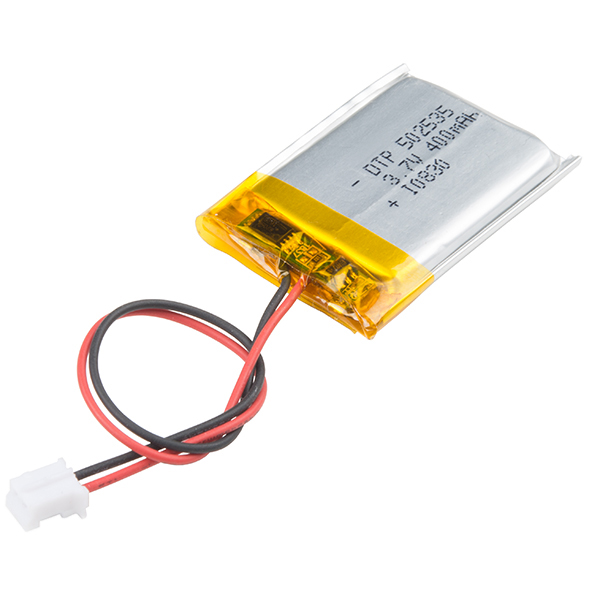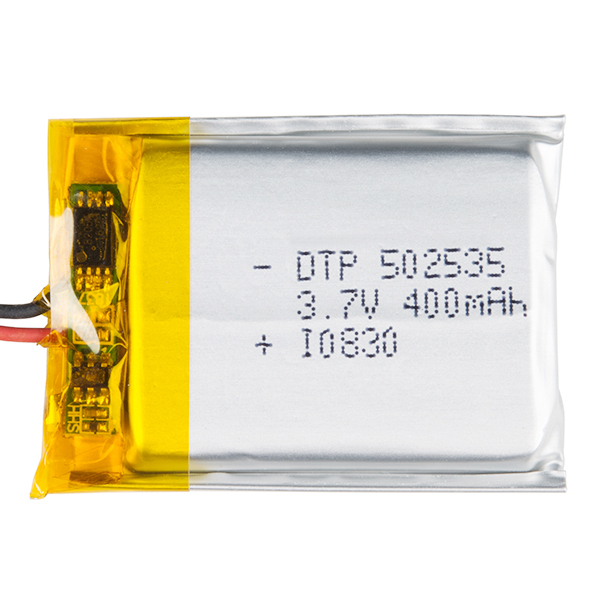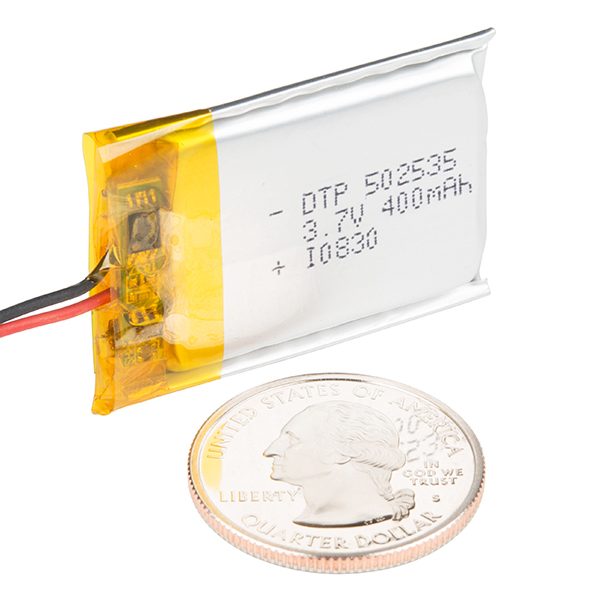This is a very small, extremely lightweight battery based on Lithium Ion chemistry, with the highest energy density currently in production. Each cell outputs a nominal 3.7V at 400mAh! Comes terminated with a standard 2-pin JST-PH connector with 2mm spacing between pins. These batteries require special charging; do not attempt to charge these with anything but a specialized Lithium Polymer charger.
The battery includes built-in protection against over voltage, over current, and minimum voltage. Please use caution when using this battery in wearable projects. When using conductive thread, a short in the thread can create sparks and heat. We recommend using coin cell batteries.
Note: This battery is not available to ship to Alaska or Hawaii, or through any express services (2-day, overnight), or internationally. This is temporary! Check out our blog post for more information. Additionally orders may take longer to process and therefore do not qualify for same-day shipping. Sorry for any inconvenience this may cause!
Note: This item is non-returnable. If this item arrives damaged or is not functioning properly, please do not hesitate to contact us to see if further actions may be taken.
Weight: 9g
- Rated Capacity: 400mAh
- Nominal Voltage 3.70V
- Max Charge Current: 1C (400mA)
- Normal Charge Current: 0.2C (80mA)
- 1.06" x 1.48" x 0.2" (26.5mm x 36.9mm x 5mm)
Lithium Ion Battery - 400mAh Product Help and Resources
Battery Technologies
February 6, 2013
The basics behind the batteries used in portable electronic devices: LiPo, NiMH, coin cells, and alkaline.
LiPo USB Charger Hookup Guide
May 1, 2014
How to charge your LiPo batteries with the USB LiPo charger. Plus how to modify your charger to set the charge current.
LilyPad Basics: Powering Your Project
September 24, 2018
Learn the options for powering your LilyPad projects, LiPo battery safety and care, and how to calculate and consider power constraints on your projects.
Adjustable LiPo Charger Hookup Guide
September 28, 2017
The SparkFun Adjustable LiPo Charger is a single-cell lithium polymer (LiPo) and lithium ion battery charger. Because it’s adjustable, this charger will be able to safely charge all of our singe-cell batteries.
LiPo Charger Plus Hookup Guide
May 30, 2019
This tutorial shows you how to hook up and use the SparkFun LiPo Charger Plus board.
LiPo Fuel Gauge (MAX1704X) Hookup Guide
February 23, 2023
Monitor your LiPo battery with the LiPo fuel gauge! In this tutorial, we will be using the MAX17043 and MAX17048 to monitor a single cell, LiPo battery over the Arduino Serial Monitor. We will also connect a display to view the output without the need to connect the microcontroller to a computer.
Single Cell LiPo Battery Care
March 16, 2023
This tutorial will go over how to safely charge, connect, disconnect, reinforcing the cables, and handle single cell LiPo batteries.
Comments
Looking for answers to technical questions?
We welcome your comments and suggestions below. However, if you are looking for solutions to technical questions please see our Technical Assistance page.
Customer Reviews
4.6 out of 5
Based on 11 ratings:
1 of 1 found this helpful:
Used this to replace a similar battery...
I had a pair of Ausdom M04 wireless headphones that stopped charging. Ausdom support was non-existent. So I took the headphones apart. The headphone battery was a KPL503030 - unavailable, even from the battery manufacturer unless I wanted to buy 500. I saw this battery via Google search and decided to give it a try. Works like a charm!
Great battery pack
Works well with the Battery Babysitter, powering a Pro Micro project.
great
worked as expected, and that is no small feat now a days
I purchased 3 Lipo 400mahr batteries and made an 11.1 volt pack by binding then together and connecting then in series. I'm using them to power an HO locomotive on my model railroad and it's working as designed. I'm using the appropriate charger and have had no trouble.
Great Purchase
Working great. I am using it to power the SparkFin Wireless Joystick Board.
Works as expected
Small and compact and works great. I'll be using it to support a pool automation project. I'll come back and give it a 5 star if it holds up to the Phoenix summer heat. :-]
Best Battery I Ever Owned
I have not owned many batteries in my lifetime but this has got to the one of the best batteries one could ask for. It's small and smooth and holds lots of energy. Also, it works very well with the Photon Battery Shield. I had no problems with running a microprocessor off this little thing. 12/10 would recommend.
Great little batteries
Use these for GPS tracking and they last a good part of the day. Very reliable. Own several and none have failed yet!
Good little battery
Tested on Raspberrypi zero-w, while compiling programs , arduino scripts, and doing updates. Pi ran for a bit over an hour and 30 minutes!
Good internal protections
They are self protected and more safe, my best ones !
worked amazing
worked great, got the vehicle mirror up and running.




Just curious why you guys call your batteries "Polymer Lithium" instead of "Lithium Polymer" like everyone else. I'm an RC hobbiest and LiPo batteries have been around for years. I've never seen one advertised as "Polymer Lithium". If you Google it you'll see you're the only ones. Is there something about the particular formulation you use that warrants the variation in the naming?
We just checked out IATA Regulation book and we found Polymer = Ion (with Alloy = Metal). So yes, you are right the name of these products is weird and redundant. Currently, the title says "Ion Lithium Ion Battery" which is no bueno. It looks like this was an original name that was never changed or updated.
Thank you very much for pointing this out we'll get this changed on all of our products.
I bought 2 of these batteries along with the Sparkfun LiPo Charger Plus. When I received the batteries they weren't outputting anything and after trying to charge I found they were only outputting 100mV. Could I be missing something obvious?
Hi there, it sounds like you are looking for technical assistance. Please use the link in the banner above, to get started with posting a topic in our forums. Our technical support team will do their best to assist you.
That being said, my guess is that you either haven't charged the batteries to full capacity or your circuit only draws that much current.
What is the gauge of the wires to this battery? I am looking to replace the JST connector plug.
How long will this battery last plugged into a blynk board?
That depends on what the Blynk board is doing and how much power it is pulling. This battery will provide 400mA for 1 hour, 200mA for 2 hours, 50mA for 8 hours, etc. Because the ESP8266 will take about 0.9mA during standby and up to 215mA for transmission (or 62mA to receive) and each I/O pin can provide up to 12mA it really depends on your project. As you can tell from the numbers having the board transmit constantly will really drain power quickly. Leaving it in standby and transmitting a short burst once per second will save a lot on battery life. For more information check out the graphical datasheet for the ESP8266 Thing Dev board.